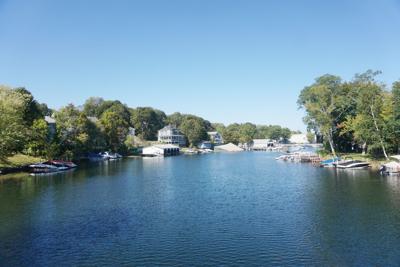LACONIA — Publics works leaders from 10 communities are calling on lawmakers to help reverse what they say is an unnecessary increase to the amount needed in a reserve fund for Winnipesaukee River Basin water treatment facilities.
State Reps. Steven Bogert (R-Laconia) and Charlie St. Clair (D-Laconia) will act as sponsors on the legislative service request seeking to reduce the amount the 10 municipalities in the Winnipesaukee River Basin Program must pay each year into the fund, a contingency account for unplanned events — “true emergencies.”
The program is the state-owned sewer system serving portions of Laconia, Belmont, Center Harbor, Franklin, Gilford, Moultonborough, Meredith, Northfield, Sanbornton and Tilton, created in 1972 as part of the Clean Water Act. It’s operated by New Hampshire Department of Environmental Services and includes a wastewater treatment plant in Franklin and maintenance facility in Laconia.
Almost $70 million has been spent to construct the system, and annual operation and maintenance costs total around $4.7 million.
Each community pays proportionally into the program’s replacement fund, which is set at 5% of the total cost to completely replace the system over 10 years.
The way that figure is calculated changed, and Laconia’s dues increased dramatically after a reevaluation pegged the new figure at about $360 million. Five years prior, the estimate was that the plant and assets were worth about $150 million, less than 50% of the new figure.
That boils down to the Winni River Basin Program attempting to collect $16 million over 10 years, divided proportionally between all participants.
Typically, Laconia would pay less than $200,000 into the replacement fund annually, but this year, public works staff received a bill for almost $750,000.
The replacement figure is reassessed every five years and, for many years, only above-ground costs were included. Now, underground features are included, too, which accounts for the massive increase.
Nate Guerette, public works assistant director, told city councilors at a meeting in June that he and Director Wes Anderson paid a $164,000 bill the previous five years, and the new one was almost $750,000, due upon receipt.
“And we said, ‘no,’” Guerette said at the meeting.
“We’ve been working on a study with Underwood on a replacement fund, what it should be, what it should be actually used for,” Guerette said. “They use it as a checkbook, they use it as a checking account, ultimately, is what it boils down to. Instead of being used for emergency repairs like it should be, while they should have maybe $3-$4 million in the bank, they’re trying to maintain $16 million now for emergency repairs.”
“The way to think of it is, if they have a bond, or they get a Clean Water Revolving Loan Fund, it's a reimbursement to them, for all their expenses. So they need a checkbook to make the initial payment until they get reimbursed by the state bond or the Clean Water Revolving Loan Fund,” Anderson said at the meeting.
The 5% figure is not up for debate — at least not yet. It’s state law: New Hampshire RSA 485-A:50 on Municipal Assessments, and would take legislative action for revision. But, after months of thought and discussion, legislative action may be around the corner.
The request has to be submitted next week, and though details will be worked out later, the change in the funding matrix for the replacement fund must be retroactive to June 30, 2024.
At a meeting Wednesday morning of the program advisory board — chaired by Anderson — members learned each municipality had approved making a request through the Legislature to reduce the percentage maintained in the replacement fund by 3%, from 5% to 2%, significantly reducing the bills owed by each municipality.
Laconia City Council, for example, signed on to the effort at their meeting on Monday night, as did councilors in the City of Franklin.
“We just need to make it official at this meeting,” Anderson said Wednesday morning. Member bodies approved the resolution unanimously.
“The next step is really just submitting the LSR,” he said. “The LSR has to be submitted next week.”
After the request is submitted, details will be worked out in order to be ready around the November timeframe.
“All of the communities agreed to the reduction from 5% to 2%, so we just finished the vote on that to make it official from the advisory board,” Anderson said.
In the meantime, member communities are working to figure out what they’ll pay in the immediate term. Laconia, for example, paid the amount equal to their previous payment, and will pay the difference once the replacement fund question is resolved.


















(0) comments
Welcome to the discussion.
Log In
Keep it Clean. Please avoid obscene, vulgar, lewd, racist or sexually-oriented language.
PLEASE TURN OFF YOUR CAPS LOCK.
Don't Threaten. Threats of harming another person will not be tolerated.
Be Truthful. Don't knowingly lie about anyone or anything.
Be Nice. No racism, sexism or any sort of -ism that is degrading to another person.
Be Proactive. Use the 'Report' link on each comment to let us know of abusive posts.
Share with Us. We'd love to hear eyewitness accounts, the history behind an article.